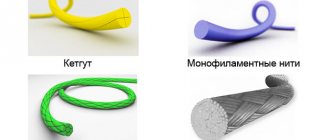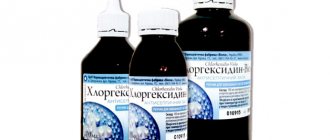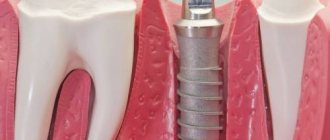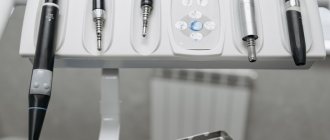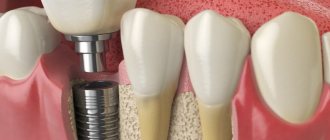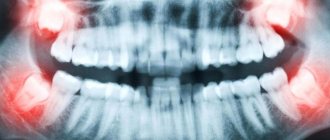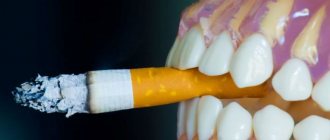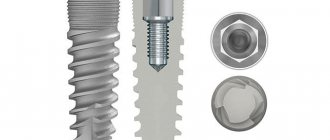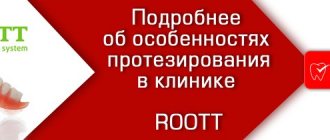Peri-implantitis is an inflammatory process that affects the mucous and bone tissues of the jaw at the site of installation of a dental implant. The danger of pathology lies in the resorption of the jawbone - as a result, the fixation of the artificial root is disrupted. The pathology is observed infrequently - in 2-5% of patients immediately or after a year. The main reason for the appearance is considered to be exposure to harmful microorganisms. In the initial stages, when inflammation has not affected the bone tissue (mucositis), conservative treatment is possible. If the inflammation has spread to the jaw, treatment is performed surgically. For prevention, choose an experienced doctor, high-quality artificial roots, and properly care for your oral cavity after surgery.
Symptoms
- Swelling, redness or blue discoloration of the gums;
- pain when pressing on the implant;
- mobility of the artificial root;
- discharge of pus, blood, formation of fistulas;
- peeling of the gums from the implant;
- temperature 38 degrees and above.
If you experience at least one of the signs, do not try to treat yourself. Contact a doctor, he will analyze the situation, conduct a diagnosis, and select a comprehensive treatment.
Stages
- Easy . Minor loss of bone around the implant. Inflammation of the mucous membrane appears, the pain is not pronounced, and the artificial root wobbles slightly. Painkillers, antibiotics, and in some cases surgical treatment are prescribed.
- Average . Half of the vertical bone loss. Pus appears, bleeding, acute pain, the gums peel off, the implant is unstable. Surgical treatment or removal of the implant is prescribed.
- Heavy . Complete bone resorption. Deep gum pockets, spread of infection to neighboring areas, increased purulent discharge, prolonged bleeding. The implant will have to be removed.
It is considered normal to lose bone around the implant from one to one and a half millimeters in the first year and no more than 0.2 millimeters per year thereafter. Bone loss above these levels is pathological.
General information
Peri-implantitis is an inflammatory process that develops directly around the installed implant. Without therapeutic measures, the pathology causes rapid destruction of the supporting bone, which threatens the loss of not only the prosthesis, but also your own teeth. According to statistics, pathology develops in approximately 12–43% of clinical cases, and often becomes the cause of implant rejection.
In terms of external signs, the disease is similar to mucositis, accompanied by inflammation of the mucous membrane in the area of the prosthesis. The difference is that with peri-implantitis there is a loss of bone tissue, but with mucositis there is no loss. To distinguish one pathology from another, a visual examination of the dentist and a number of diagnostic measures are necessary.
Diagnostics
If you find signs of a disease or a suspicion arises from a doctor during a routine examination (during visual examination or palpation), a diagnosis must be carried out:
- Computer diagnostics. Panoramic X-ray or 3D computed tomography - to assess jaw resorption.
- Periapical x-ray. Obtaining information about the condition of the artificial root and the area around it.
- Probing. To assess the depth of the periodontal pocket.
Additional studies are prescribed:
- Dentistry - a detailed examination of the mucous membrane helps to see the internal picture of the anomaly in the initial stages.
- Clinical tests, Schiller's, Russell's tests, pH-metry.
- Biochemical, bacteriological tests provide additional information about the disease.
Based on the results, a diagnosis is made and appropriate treatment is prescribed.
How to treat peri-implantitis without removing the implant
At the first stage, when the titanium root is stable and bone resorption is insignificant, removal of the implant can be avoided; the doctor selects the treatment method. If the disease is at the second or third stage, treatment is ineffective, the risk of relapse is high, so the implant is removed.
Treatment methods for the mild stage are used comprehensively:
Cleaning the artificial root
Removal of plaque and microflora contamination from the surface, antiseptic treatment. Ultrasound, laser or Air Flow is used. The difficulty lies in the active coating of the titanium roots, which can be damaged during cleaning. Cleansing with the Vector device will help solve this problem. This is an ultrasonic device with piezoceramic discs that remove plaque, bacteria, and biofilms from the surface of the implant without damaging the materials.
Therapy with antibacterial drugs
The drugs relieve inflammation, sometimes they are prescribed for general purposes, but a good doctor will first analyze the microflora to assess sensitivity to the drugs. Amoxicillin, Ceftriaxone, Amoxiclav are used - based on the results of an analysis of the microflora of the oral cavity.
Increased Bone Volume (BVR)
Bone regeneration is aimed at deep cleaning of the implant and restoration of bone size. A dissection and peeling of the gum is performed to access the defect area. Granulations, inflamed gingival and bone tissues are removed. Bone material is implanted and membranes are applied for fixation. This method is the most effective, as deep mechanical and antiseptic cleaning is carried out.
Correction of gum position
Aesthetic surgery is performed after bone grafting or independently in case of loss of gum tissue.
Use of bone growth stimulants
Keystone stimulators accelerate tissue regeneration and are used in our Center even at the stage of implant installation.
Prosthesis correction
It is necessary if the cause of the disease is overload of the implants. This occurs when an incorrectly selected prosthesis or a change in bite.
Doctor's advice - when is re-implantation possible?
After extracting the artificial root, a break is taken for 1-2 months. There is no need to wait any longer, otherwise jaw atrophy will begin. Reimplantation is combined with osteoplasty if there is enough bone and gum tissue in the implant area. Otherwise, after the hole has healed, bone augmentation is first carried out in a separate stage, and only then the implant is installed.
Levin Dmitry Valerievich
Chief physician, Ph.D.
Classification
Based on the time of occurrence after implant installation, peri-implantitis is divided into:
Early – the occurrence of rejection of the implant system before a month after surgery (reason – non-fusion of the implant with the jaw).
Medium-term – rejection within a period of three months to two years (reason – defects in calculating the load of the system on the alveolar process).
Late – the occurrence of problems with implants for a period of more than two years (the reason is the patient’s poor oral care).
Reasons for the development of peri-implantitis
Implants have a rough surface, which helps to better osseointegrate into bone tissue. When the artificial root is exposed, the surface is exposed to bacteria. If the patient does not maintain oral hygiene, bacterial plaque accumulates on the implant.
According to the results of early studies, the cause of the development of peri-implantitis is microbes of the intestinal group, and the role of fungi of the genus Candida has been established. According to the results of recent tests, the microflora is associated with bacteria that cause periodontitis. But it is still impossible to fully say which microbes cause the disease.
The causes of pathological bone loss and exposure of the implant neck may be medical errors or non-compliance with recommendations by the patient.
Doctor's mistakes
It is important to contact attentive and experienced doctors, because the success of implantation at the preparatory, surgical and orthopedic stages depends on them. Possible mistakes:
- Patient preparation. Insufficient sanitation of the oral cavity was carried out to eliminate pathogenic microflora, periodontal tissue diseases were not taken into account, and teeth were poorly treated. Implantation does not take into account chronic diseases, ENT pathologies, or the patient’s addictions to alcohol and smoking.
- Diagnostics. Using only OPTG data without CT to assess the condition and size of the jaw bone.
- Operation planning. Incorrectly selected implantation site, distances from neighboring teeth, sizes of bone and gum tissue are not taken into account.
- Surgical stage: deviation of the implant installation angle, failure to maintain sterility, damage to the titanium root coating, saliva getting into the prepared bed, use of non-original products.
- Prosthetics: overload of the artificial root with the prosthesis, loose connection of the implant and abutment, cement fixation of the crown, trauma to the mucous membrane.
Patient errors
Patients with chronic diseases should not hide their condition from their doctor. To obtain a favorable outcome, additional examinations and careful diagnostics will be required. An honest doctor will warn the patient about possible risks, and in case of absolute contraindications, refuse implantation.
Diseases that increase the risk of peri-implantitis include:
- bruxism – teeth grinding overloads the implants;
- Corticosteroid therapy leads to bleeding and delayed tissue healing;
- chemotherapy, HIV - immunosuppression occurs;
- Diabetes mellitus is a metabolic disorder.
The following also lead to the development of peri-implantitis:
- refusal to comply with hygiene rules or incorrect compliance;
- alcohol abuse, smoking;
- ignoring the treatment of chronic diseases.
Related articles:
- Rejection of dental implants
- Removing a dental implant
- Implantation guarantee
Prevention
Peri-implantitis is one of the most common complications in dental implantology. For the purpose of prevention, a set of preventive measures has been developed; if observed, the development of peri-implantitis tends to zero.
After dental implantation it is recommended:
- Visit a specialist regularly, twice a year, for preventive examinations.
- Complete professional hygiene procedures within the prescribed time frame.
- Constantly care for your teeth and gums using special pastes and toothbrushes.
- On a systematic basis, undergo implant care procedures in the clinic.
- Eliminate excessive loads on the implant.
- The patient should avoid damaging the implanted dental system.
- Take x-rays regularly and monitor the condition of the bone plate.
- Treat all inflammatory processes in the oral cavity in a timely manner.
It is enough to follow all these simple rules so that peri-impantitis does not develop.
What we guarantee
- Correct implantation, strict adherence to protocols. Our Center has a team of highly qualified doctors, employees of Moscow medical universities. Implantologists are proficient in all known protocols, and constantly undergo internships and advanced training courses in the USA, Germany, and surgical centers in Russia.
- Installation of high-quality Nobel Biocare implants. They have no restrictions on installation, are suitable for all clinical cases, the survival rate is 99.3%, and are protected from counterfeiting. Patented TI-Unite surface promotes faster healing. We provide a lifetime warranty.
- Thorough diagnosis. The center is equipped with modern diagnostic equipment, the results will be known in 15 minutes.
- Quick response to problem . You can call us at any time of the day or any day of the week if something is bothering you. In addition, we conduct preventive examinations and free CT examinations after surgery.
Cost of treatment for reimplantitis
If your case is under warranty, the treatment is provided free of charge, and for reimplantation you should also be provided with all the materials necessary for a successful operation free of charge. You will only have to pay for the doctor's services. If you do not want to undergo treatment for peri-implantitis in the same clinic where you received implants, the cost of the service can range from 20 to 40 thousand rubles.
You can protect yourself from all possible unpleasant consequences of unsuccessful dental implantation by choosing the right dentistry! Our clinic in Moscow - VENSTOM - employs experienced and competent implantologists who plan the implantation operation in detail using the most modern technologies and carry out the implantation of implants without deviations from the protocol. This approach guarantees impeccable quality of treatment and completely eliminates possible complications!
Still have questions about the topic of the article? Ask them to us on the forum of our website or call us at our contact phone number!
